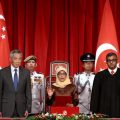
President Xi Jinping and Swiss President Doris Leuthard address the media in Bern, Switzerland, on Monday. XU JINGXING / CHINA DAILY
After ‘fruitful’ talks, Xi says two sides will work together to maintain open and inclusive global trade
China and Switzerland agreed on Monday to upgrade their free trade agreement, amid both countries’ calls for opposition to protectionism, during President Xi Jinping’s state visit.
Witnessed by Xi and Swiss President Doris Leuthard, the two sides signed 10 documents to boost cooperation in areas including free trade, clean energy, sports, customs and intellectual property.
Describing the talks with Leuthard as “fruitful”, Xi told reporters after the signing ceremony that China and Switzerland will make joint efforts to maintain an open and inclusive global trade system.
The China-Switzerland FTA, which waived most tariffs on goods, became effective in July 2014. Talks began in 2011, and the two sides sealed the deal in July 2013. Switzerland is the first continental European country to conclude and implement a free trade agreement with China.
China and Switzerland hold similar views on opposition to trade protectionism, Xi said, adding that economic globalization is an inexorable trend. He also called on the two countries to provide more confidence and “positive energy” to the global economy.
“The China-Switzerland relationship has become a model for the cooperation between two countries with different social systems, development stages and size of homelands,” Xi said.
Leuthard spoke highly of China’s promotion of free trade, saying free trade is “of vital importance for an open economy like Switzerland”.
Bilateral trade has increased remarkably since implementation of the two countries’ free trade agreement in 2014, she said, adding that there is still much potential for further trade growth.
The two countries also agreed during the talks to lift technological barriers and streamline customs procedures, she said, adding that China has played a responsible role in facing global challenges.
Xi will make a speech at the opening ceremony of the Davos World Economic Forum on Tuesday.
Leuthard said she was glad to receive the invitation from Xi to attend an international summit on the Belt and Road Initiative in May in Beijing.
Alain Gaschen, minister and deputy head of mission at the Swiss embassy in China, said that Chinese entrepreneurs are increasingly showing interest in developing their business in Switzerland.
“We are among the top 20 economies to have a free trade agreement with China. We welcome Chinese investments,” he said.
He Maochun, director of the Research Center for Economic Diplomacy Studies at the Tsinghua University Institute of International Studies, said the China-Switzerland relationship, highlighted by the FTA and the two countries’ innovative strategic partnership, is an example of China-Europe cooperation.
“Switzerland has the craftsman spirit in precise instruments, advanced machine tools and clocks and watches, which is quite supplementary to China. China’s huge market and Switzerland’s techniques could lay a good foundation for a closer economic and diplomatic relationship between the two countries,” he said.
Huang Ping, director of the Institute of European Studies at the Chinese Academy of Social Sciences, said China and Switzerland have potential for innovative cooperation in several areas, such as manufacturing, immigration management, anti-terrorism and healthcare.
“China could seek solutions for the problems it faces now through cooperation with Switzerland,” he said.
Statistics from the Swiss government show that in 2015, the country saw a 33 percent increase in the number of hotel bookings by Chinese tourists.
China has become the fourth-largest source of tourists for Switzerland, behind only Germany, the United States and the United Kingdom.
The two countries established an innovative strategic partnership during then-Swiss President Johann Schneider-Ammann’s state visit to China in April.


